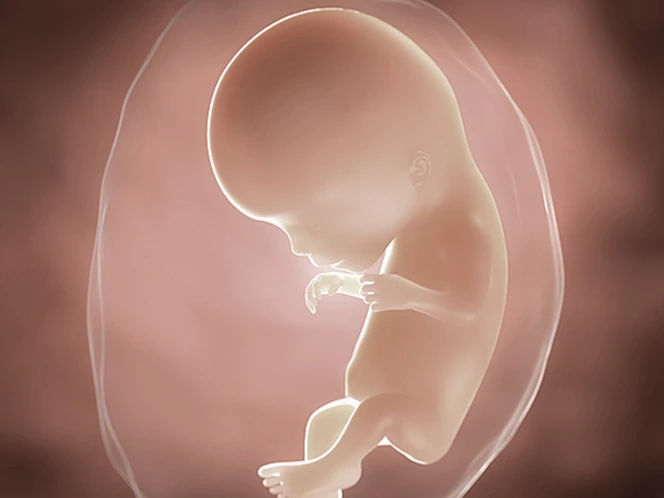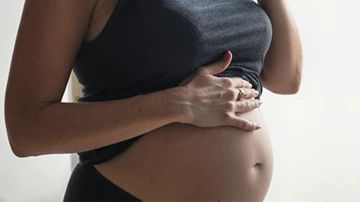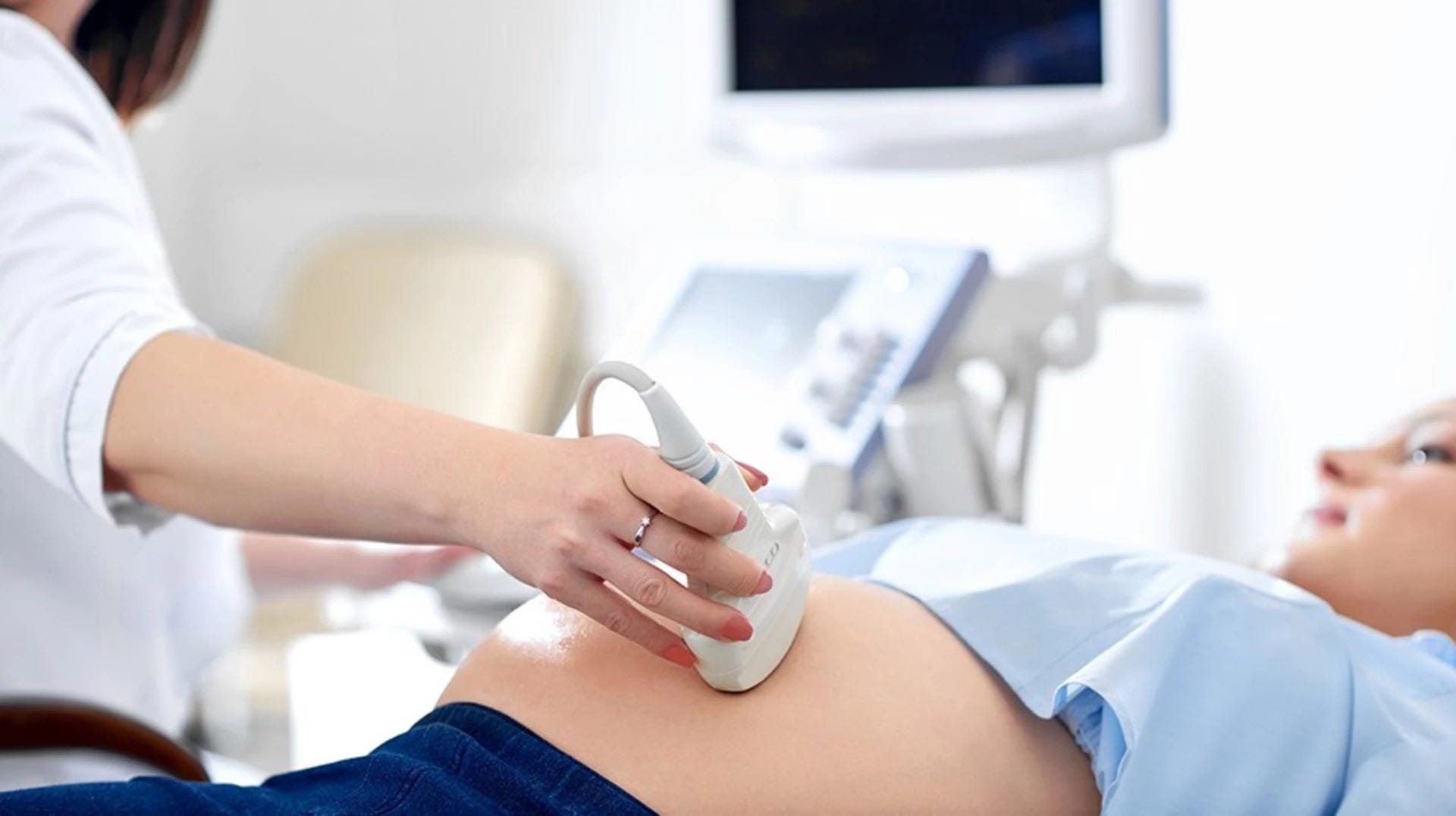At 11 weeks pregnant, your baby is about to begin a rapid phase of growth. They’re still only 4-5cm in length, making them the size of a lime. However, they’re growing and developing rapidly: all of the facial bones are now in place, fingers and toes are separating from their webbed beginnings and ear buds take on a more familiar shape1.
11 weeks pregnant: Pregnancy Symptoms & Baby Development

Explore pregnancy stages week by week
Baby development at 11 weeks

How big is my baby? And what does my baby look like?
Internally, your baby's brain, lungs, liver and kidneys are formed by 11 weeks, but the various body systems will continue to develop throughout your pregnancy2.
Although your baby has already been making jerky movements for some time2, you’re unlikely to feel any kicks until around 17 to 18 weeks, or later if this is your first pregnancy1.
Pregnancy at 11 weeks (first trimester) Body changes
As your waist begins to thicken you may begin to notice the beginnings of your pregnancy bump. Don’t fret if there’s nothing to see yet, it probably won’t take long before you’re showing.
Pregnancy symptoms at 11 weeks
Early pregnancy symptoms vary from person to person. At 11 weeks3, you may experience any of the following signs of pregnancy, or no symptoms at all:
Your breasts may become larger and feel sore. You may also find your nipples stick out more than usual and darken in colour as your body begins to prepare for breastfeeding.
During the first 12 weeks, hormonal changes can leave you feeling tired or exhausted.
Morning sickness affects the majority of mums-to-be4 in the first trimester. It can strike at any time of the day or night and varies from mild nausea to sickness throughout the day.
The pregnancy hormone progesterone slows down your digestion which can lead to bloating and excess gas5.
Light cramping and spotting are common in the early stages of pregnancy6,7. If the pain becomes severe (stronger than period cramps) or if bleeding becomes heavy, you should talk to your GP.
Pregnancy hormones, oestrogen and progesterone, soar during the first 12 weeks of pregnancy8, affecting how you’re feeling emotionally. Get plenty of rest and light exercise to keep you feeling like yourself.

Good news about morning sickness
Pregnancy sickness is usually limited to the first trimester. For most women, symptoms peak around weeks 9 to 11 and improve markedly between weeks 12 and 149. For some, pregnancy sickness goes on longer, until around 20 weeks, and acid reflux from the second trimester onwards can also cause nausea and vomiting. Find out more about morning sickness, and how to treat it.

Your first ultrasound
Between 8-14 weeks, you’ll have your first ultrasound. Ultrasound scans use harmless sound waves to show a detailed picture of your baby inside your womb. Neither you or the baby will feel a thing - except a little elation on your part at seeing your child for the first time.
Focus on calcium
Calcium is essential for the development of bones and teeth so your baby will need quite a bit of it10. Milk is a rich source of calcium, which has several important roles10.
- It regulates muscle contractions, including your baby’s heartbeat
- It helps your blood clot normally
- It contributes to the healthy functioning of muscle tissue and nerves

Your calcium requirements don’t change during pregnancy, but it’s more important that you meet your Recommended Daily Allowance.
Sources of calcium
- Dairy products, including pasteurised milk, cheese and yoghurt
- Some nuts and seeds, especially almonds and sesame seeds
- Beans and pulses
- Figs Spinach
- Tofu Calcium fortified breakfast cereals and white bread
- Calcium fortified drinks such as some soya milks
The science behind Calcium, powered by Nutricia
Widely recognised for its importance in the development of healthy bones and teeth, calcium is an essential nutrient for your baby throughout pregnancy12. Thankfully, it’s easily obtainable from a wide variety of sources.
But calcium supports more than just bones and teeth. It’s used by every single cell and is present in tissues and body fluids. It also has other roles, including helping muscles and nerves function, aiding digestion and enabling blood to clot13. According to one study, a good supply of calcium in pregnancy may help to reduce the risk of pre-eclampsia and preterm birth14.
Foods to avoid while pregnant
There's nothing specific to avoid during individual weeks, but throughout your pregnancy, it's wise to give the following a miss:
- Raw and undercooked meat
- Unpasteurised milk and dairy products
- Liver, and excessive consumption of foods high in vitamin A
How much weight should I gain during pregnancy?
Weight gain during pregnancy depends on your pre-pregnancy weight, and varies a great deal from mother to mother. Most women gain between 10kg and 12.5kg (22–28lb) while pregnant, some of which is the weight of the growing baby15. Learn everything you need to know about weight gain in pregnancy.
If you haven’t been to see your GP yet, you should make an appointment so they can start planning your antenatal care, including your first ultrasound scan.
related articles
Read More

Need some help?
You can get quick answers to common questions in our FAQs.
Alternatively, if you need help with general pregnancy or baby advice, or maybe on using or ordering our products - our expert team are always on hand to talk about feeding your baby.
1. Papaioannou GI et al. Normal ranges of embryonic length, embryonic heart rate, gestational sac diameter and yolk sac diameter at 6-10 weeks. Fetal Diagn Ther 2010;28(4):207-19.
2. Murkoff H, Mazel S. What to Expect When You’re Expecting. 4th ed. London: Simon & Schuster Ltd, 2009. p. 169.
3. Deans A. Your New Pregnancy Bible, The experts’ guide to pregnancy and early parenthood. 4th ed. London: Carroll & Brown Publishers Limited, 2013. p. 33.
4. NHS UK. You and your baby at 9-12 weeks pregnant [Online]. 2013. Available at: www.nhs.uk/conditions/pregnancy-and-baby/pages/pregnancy-weeks-9-10-11-12.aspx Page last reviewed: 17 July 2018. Next review due: 17 July 2021.
5. NHS. Signs and symptoms of pregnancy [Online]. Available at: https://www.nhs.uk/conditions/pregnancy-and-baby/signs-and-symptoms-pregnancy/ Page last reviewed: 6 October 2018. Next review due: 6 October 2021.
6. Noel M. Lee, M.D., Gastroenterology Fellow and Sumona Saha, M.D., Assistant Professor of Medicine. Nausea and Vomiting of Pregnancy. 2011. Pub 2013. [Online] Available at: https://www.ncbi.nlm.nih.gov/pmc/articles/PMC3676933/
7. NHS Start 4 Life. 1st trimester, week 10 [Online]. Available at: https://www.nhs.uk/start4life/pregnancy/week-by-week/1st-trimester/week-ten/
8. NHS. Vaginal bleeding in pregnancy [Online]. Available at: https://www.nhs.uk/conditions/pregnancy-and-baby/vaginal-bleeding-pregnant/ Page last reviewed: 26 January 2018. Next review due: 26 January 2021.
9. NHS. Stomach pain in pregnancy [Online]. Available at: https://www.nhs.uk/conditions/pregnancy-and-baby/stomach-pain-abdominal-cramp-pregnant/ Page last reviewed: 1 May 2018. Next review due: 1 May 2021.
10. Claudio N. Soares and Brook Zitek. Reproductive hormone sensitivity and risk for depression across the female life cycle: A continuum of vulnerability? 2008. [Online] Available at: https://www.ncbi.nlm.nih.gov/pmc/articles/PMC2440795/
11. Department of Health. Report on Health and Social Subjects 41. Dietary Reference Values for Food Energy and Nutrients for the United Kingdom. London: TSO, 1991.
12. European Union. Commission Regulation (EU) No 432/2012 of 16 May 2012 establishing a list of permitted health claims made on foods, other than those referring to the reduction of disease risk and to children’s development and health. OJ L 136 2012;1-40.
13. NHS choices. How much weight will I put on during my pregnancy? [Online]. Available at: https://www.nhs.uk/chq/Pages/2311.aspx?CategoryID=54 Page last reviewed: 18 October 2018. Next review due: 18 October 2021.
Last reviewed: 3rd December 2019




